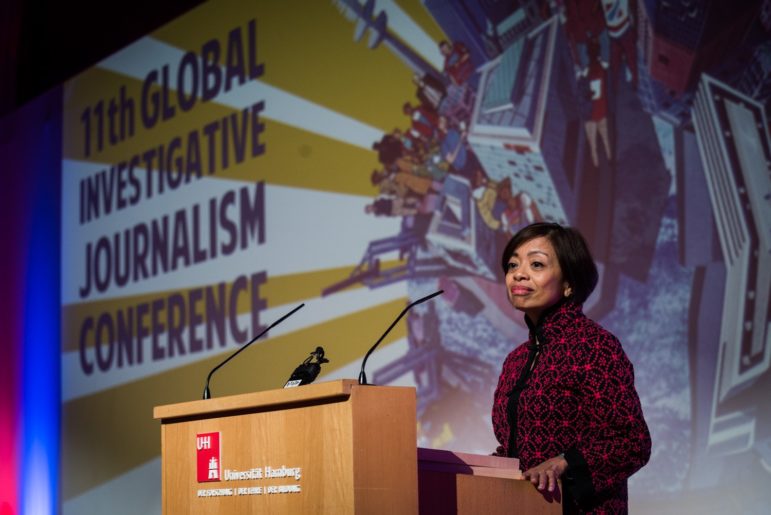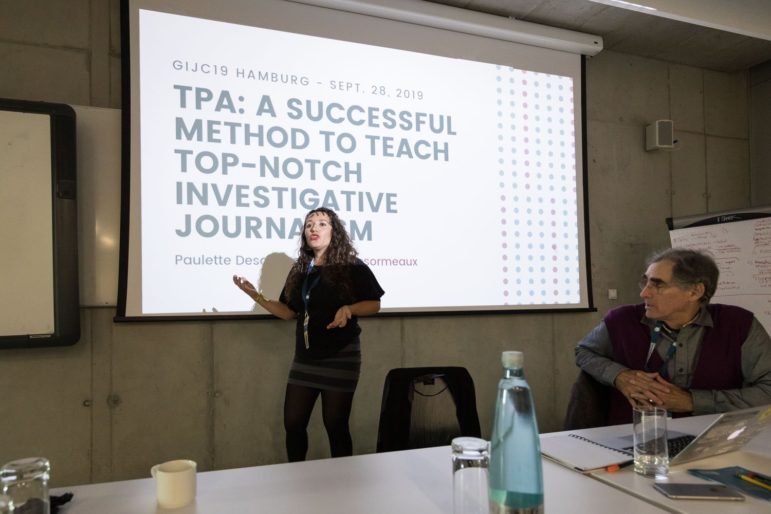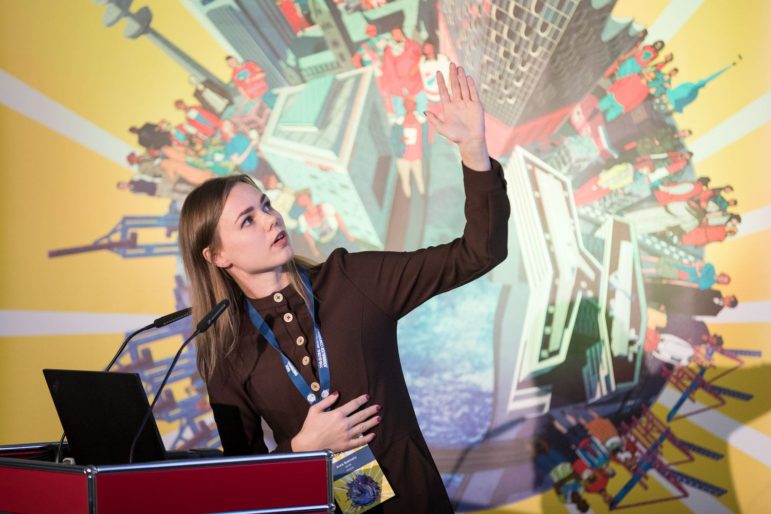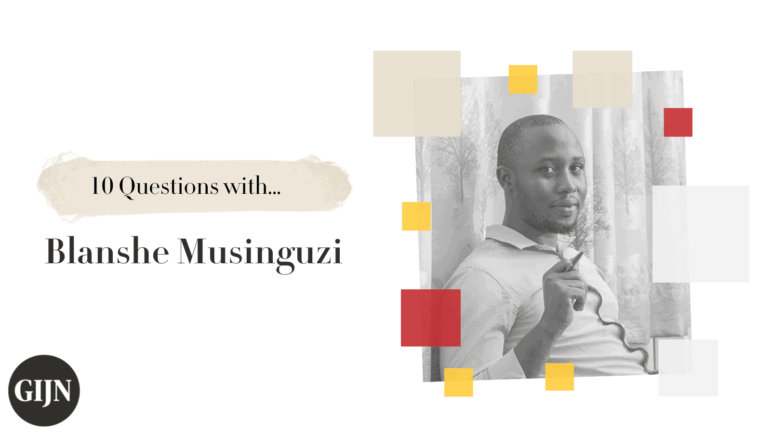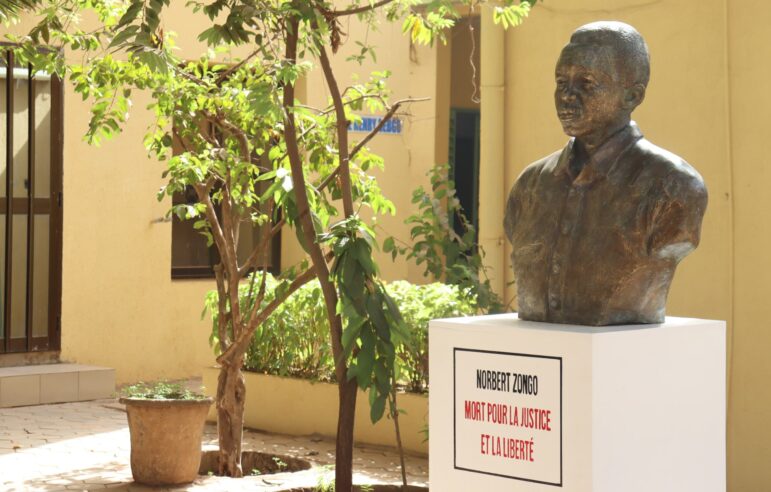

Image: Shutterstock
Mentoring Under Pressure: How One Nigerian Woman Is Shaping the Next Generation of Investigative Reporters
Investigative journalism remains one of the most dangerous beats in Nigeria. Reporters risk harassment, arrest, or even death for exposing corruption and abuse. The country currently ranks a dismal 122nd out of 180 on the 2025 World Press Freedom Index compiled by Reporters Without Borders, having fallen 10 spots in the past year. In this climate of shrinking press freedom and frequent impunity for attacks on the press, many young people hesitate to enter the field at all.
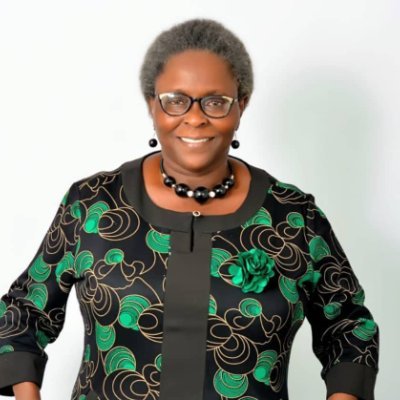
Joke Kujenya. Image: Courtesy of Kujenya
Against this backdrop, Joke Kujenya, senior investigative journalist and publisher at JKNewsMedia, has spent more than two decades trying to shift the balance. As executive-in-charge of the Media Mentors Journalism Centre (MMJC), founded in 2004, and through her Media Mentor Leadership Academy, she has trained, mentored, and supported more than 100 young investigative journalists in Nigeria. Her goal is simple but ambitious: equip them with the skills, mindset, and resilience needed to hold power to account.
“Journalists need to be equipped with the knowledge of ethics and skills to develop impactful reporting and that is the aim of the mentoring,” Kujenya says.
Kujenya’s work mirrors grassroots efforts in other high-risk regions, such as the Philippine Center for Investigative Journalism or Mexico’s Periodistas de a Pie, both of which provide training and community for journalists who work under pressure. Her approach in Nigeria combines teaching practical tools, like fact checking and data analysis, with closer, long-term mentoring that helps young reporters finish and publish their stories.
Training That Sparked a Career
In 2021, The Cable Newspaper Foundation contracted Kujenya as a program officer to facilitate an in-person training on investigative reporting for early-career student journalists in north central Nigeria. The workshop, held in Abuja under the foundation’s Campus Civic Media Campaign (CCMC) and supported by the Open Society Initiative for West Africa (OSIWA), brought together 15 student journalists from seven different universities.
One of the attendees was Jairus Awo, then a student journalist at Benue State University in central Nigeria. For many institutions in that area, journalism was not widely practiced among students, and opportunities for training were rare. Unlike in southwestern Nigeria, where vibrant press clubs and campus media thrive, Nigerian schools in his region struggle with underfunding, censorship, insecurity, and weak mentorship, leaving student journalism largely underdeveloped.
Campus journalists, as they are known in Nigeria, are budding reporters who may or may not have received formal classroom instruction but share a passion for the craft. The Abuja training exposed them to multiple dimensions of reporting:
- Ajibola Amzat, then at the International Centre for Investigative Reporting (ICIR), taught news writing and ethical reporting.
- Ruth Oluronbi of Bloomberg focused on data and fact checking.
- Kunle Adebayo, then investigative editor at HumAngle, emphasized bravery and curiosity as essential traits for investigative reporters.
After the in-house sessions, participants were paired with mentors to guide them toward producing a story for publication. Awo was eager to learn.
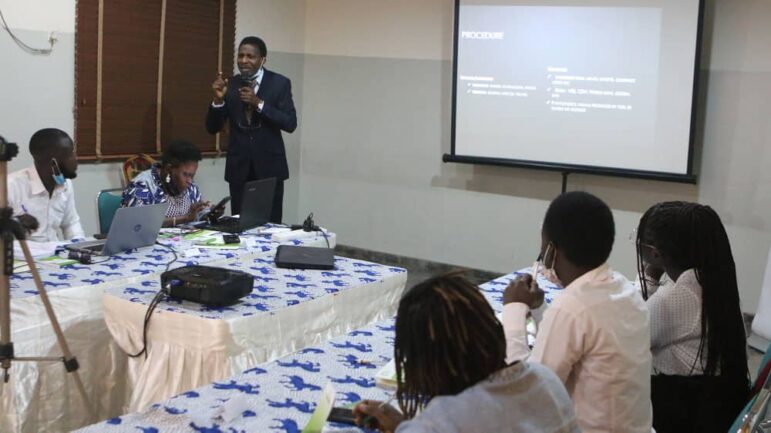
Joke Kujenya (seated, blue and white dress) at one of her campus journalist training sessions in Abuja in 2021, organized by The Cable Newspaper Foundation. Image: Courtesy of Kujenya
From First Byline to New Platform
Under Kujenya’s guidance, Awo pursued a story in Benue State about residents forced to dig shallow pits for drinking water. His investigation documented how families risked typhoid and diarrhea due to a lack of access to clean water. The story, which was published in The Cable, marked his first professional byline.
“It was through her [that] I learnt the rudiments of journalism, where and how a story should be approached,” Awo recalls.
The mentorship also gave him ongoing access to The Cable. By 2022, he had become a skilled investigative journalist. That year, he exposed how an Independent National Electoral Commission (INEC) officer in Benue demanded payments from voters seeking new registration cards ahead of the general elections. In another story, he reported on a night of violence in which more than 100 people were killed by suspected bandits in a Benue community.
“She encouraged me to develop an interest in specialized reporting. I focused on climate reporting, which allowed me to win an online fellowship to COP26 in 2021,” he explains.
A year after attending Kujenya’s mentorship program, Awo launched TheMiddleBelt Reporters, an online platform dedicated to journalism from central Nigeria, covering Kwara, Kogi, Niger, Abuja, Nasarawa, Benue, and Plateau states. His aim was to provide space for journalists there who struggled to place stories in mainstream outlets.
The site has since carried out investigations on how a clinic forced mothers to risk home births and how drug shortages and poor facilities drive dangerous self-medication in rural Benue.
“I am able to maintain the platform to the standard through [Kujenya’s] mentorship,” Awo says of how Kujenya guidance went beyond merely instruction in reporting skills. “She taught me how to structure impactful investigations, manage people, and think about sustainability,” he explains. Her mentorships, he adds, helped him build TheMiddleBelt Reporters into a platform known for strong accountability journalism that continues to gain recognition.
The Mentor’s Journalism Journey
Kujenya’s own journey into investigative journalism began nearly 30 years ago at the Independent Communication Network, which was a publisher of The NEWS/TEMPO and, later, PM News Nigeria. She was inspired by the work of notable Nigerian journalists Bayo Onanuga, Babafemi Ojudu, and Dapo Olorunyomi, who later became her mentor.
“Whenever the news report came out, the government of the day would be agitated and angry, and I would see how excited the journalists were. I began to understand the power of journalism to expose the truth and hold power accountable,” Kujenya recalls.
During this period, Olorunyomi and Ojudu were repeatedly targeted by the military government of Sani Abacha, and both fled into exile in 1997. Watching their courage under pressure shaped how Kujenya approached her own work.
“I started wondering in my heart, I can do these things. I like the way they challenge authority with facts and evidence, and that gives me pride,” she says.
During her career, Kujenya’s investigations have focused on education, infrastructure, and modern slavery. In 2012, she published a story on young women trafficked abroad for prostitution. In 2013, she exposed mismanagement in the federal government’s textbook project, and she also reported on medical malpractice in Wrong Diagnoses, Poor Documentation.
Inside The Nation newspaper, where she rose to assistant editor of investigations, her colleagues recognized her impact.
Lekan Otufodunrin, executive director of the Media Career Development Network and former Sunday editor at The Nation, says: “Kujenya was one of the outstanding reporters when we started in the 1980s, and at a point in time, she was the only news editor of a national newspaper, a rare position to find a woman. She is a perfect example of a news reporter and also an excellent investigative journalist.
Kujenya reflected that her path into investigative reporting was marked by gender bias and real risks under authoritarian regimes. “There were moments when the fear was real,” she said, crediting resilience and her own mentors, like Dapo Olorunyomi, for sustaining her in the profession. Her advice: keep learning, seek support, and never let fear or stereotypes define your limits. For mentors, she urges patience and modeling strong ethics: “Mentorship is not barking orders, it’s guiding with balance and integrity.”
“She served as one of our panelists at ReportWomen! stakeholders’ meeting in Lagos,” recalls Motunrayo Alaka, executive director of the Wole Soyinka Center for Investigative Journalism. “From that engagement and her broader professional work, we’ve recognized her contributions to the growth of investigative journalism and to advancing issues concerning women and girls.”
Mentoring Successes and Challenges
Beyond workshops, many journalists seek Kujenya’s input through her one-on-one counseling. Justina Asishana, an award-winning data and investigative journalist and a Wole Soyinka Centre fellow, says her work has improved significantly thanks to her mentor’s individual guidance.
“Kujenya has been my mentor for several years now. She has mentored me on some journalism projects, which helped me fine-tune my reports,” Asishana says.
She adds that Kujenya’s involvement does not end with editing. “Her mentoring is a very close one, as she likes to know what her mentees are up to and how she can be of assistance.”
Justina Asishana says that, thanks to Kujenya’s mentorship, she has sharpened several investigations, including Gold Rush: Illegal Miners Invade Lands and Farms in Minna project, by learning how to refine story framing, use data and field verification, and employ digital tools she hadn’t used before. “She opened my eyes to techniques beyond what I’d learnt in class, mapping, source tracing, and persistent fact-checking,” she notes.
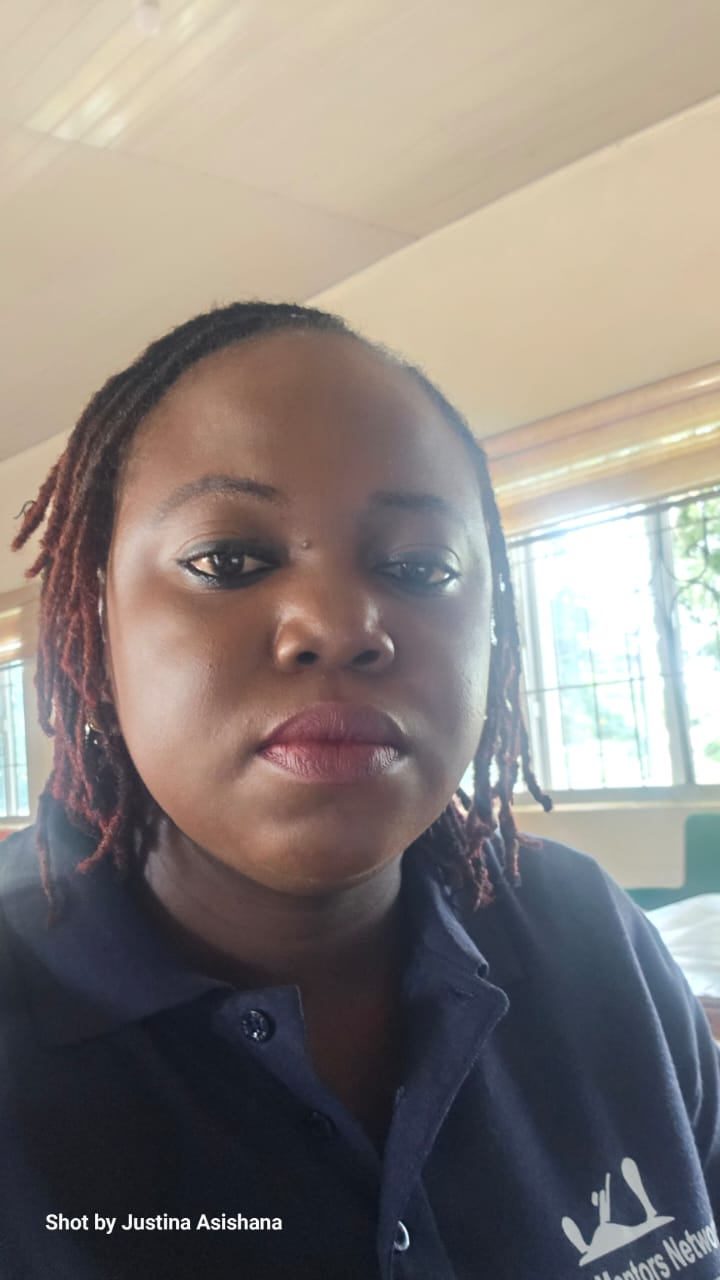
Justina Asishana, an award-winning data and investigative journalist and Kujenya mentee. Image: Courtesy of Asishana
Kujenya’s more than two decades of mentoring have brought clear results, but also significant challenges. Some young journalists lose interest in investigative reporting, citing financial insecurity, and switch to other fields like public relations. Shrinking newsroom budgets have reduced opportunities for longform investigations, mentorship, and training. Global economic strains have also limited grant opportunities, even as new technology reshapes reporting.
These constraints mean that her mentorship can only reach so far. It cannot guarantee sustainable funding or protect young reporters from systemic threats. What it can do, however, is help early-career journalists learn how to investigate, finish, and publish, despite those looming obstacles.
Kujenya said her commitment to mentoring young journalists has endured despite the hurdles because she sees it as a duty to the profession and to society. “For me, it has never been about convenience. I continue because I know that if we don’t pass on skills, courage, and ethics, the chain of accountability journalism will break. Mentorship is how we sustain the craft, especially in difficult times,” she explained.
Among those she considers her biggest mentorship successes are journalists like Jairus Awo, whose TheMiddleBelt Reporter now gives a voice to underrepresented communities in Nigeria’s central region, and Johnston Kpilaakaa, now sub-editor at Human Angle.
Practical Formula
Across her career, Kujenya has emphasized a few consistent principles:
- Skills: Teaching how to frame an investigative question, gather documentation, and corroborate evidence.
- Ethics: Reinforcing accuracy, fairness, and sensitivity when reporting on vulnerable communities.
- Follow-through: Staying in touch with mentees after a workshop, offering feedback, and helping to shape drafts into publishable work.
Her advice to aspiring investigative journalists is clear: “Be advice seekers, courageous, tactical, ethical, professional, and hopeful. Mentors are available in every facet of our journalism.”
When asked about how mentorship in journalism has evolved, Kujenya reflects on both progress and setbacks. She explains that, in the past, mentorship was “more hands-on as we collaborated with senior editors telling them our expectations and they got involved by helping to closely guide younger reporters through practical newsroom training.” While this approach was rigorous, she acknowledges that it often came with “a tough, sometimes harsh environment that left little room for nurturing creativity or balancing well-being.”
Today, she observes that mentorship has become less structured, with many young journalists “left to figure things out alone in this fast-changing digital media space.” She emphasizes the need for a balanced approach going forward: “I want it to be done with more and better intentionality, and supportive, combining the rigor of old-style newsroom training with modern skills building. I believe future journalism and journalists would benefit from structured programs that emphasise ethics, digital competence, resilience, and continuous practical guidance beyond just the first years in the newsroom.”
Long-Term Impact
Mentorship will not fix Nigeria’s systemic press freedom challenges. But it has given individual reporters a path into the field and helped them produce stories that otherwise may not have been written. A young journalist in Benue publishes his first investigation and later starts a regional news outlet. A data journalist sharpens her reporting and wins fellowships. A newsroom colleague describes a determined editor who modeled how to push investigations forward.
These are concrete, verifiable outcomes. They demonstrate how mentoring, while seemingly limited in scope, can have a ripple effect that strengthens investigative journalism even in one of the world’s most difficult environments for the press.
Kujenya’s steady focus on training and supporting younger reporters shows that solutions do not always come in sweeping reforms. Sometimes they come in the form of a mentor, willing to stay close, ask hard questions, and remind the next generation that accountability reporting is still possible.
On the question of how she feels about the results of all her efforts, Kujenya points to those tangible impacts of her mentees: “Each time I see a young reporter get published, win a fellowship, or launch their own initiative, it makes the sacrifices worthwhile. It tells me that the investment is multiplying.”
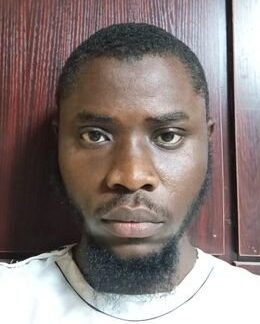 Abdullahi Jimoh is an independent journalist from Nigeria. He is a contributor at Media Diversity Institute UK, The Continent, The Africa Report, Minority Africa, El País, and elsewhere.
Abdullahi Jimoh is an independent journalist from Nigeria. He is a contributor at Media Diversity Institute UK, The Continent, The Africa Report, Minority Africa, El País, and elsewhere.

